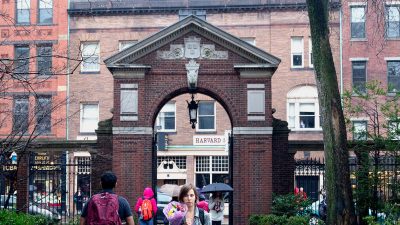A recent poll by WGBH News found that 86 percent of American residents said it was at least somewhat important to strive for an ethnically diverse student body at universities. However, 72 percent said they do not support the use of race as a factor in the college admissions process.

The poll asked 1,002 adults nationwide to answer questions on a variety of issues regarding higher education. Topics ranged from mental health to freedom of speech on campus.
Ken Cooper, senior editor for WGBH who oversaw the polling project, wrote in an email that conducting the poll felt vital, given the base location of his news organization.
“… WGBH and our newsroom have a unique perch, in Boston, a major hub of the higher education industry,” Cooper wrote. “We decided it was critically important to our audience to take the country’s pulse on some fundamental questions about higher education.”
Cooper wrote that the survey results indicated that most white individuals likely felt that considering race as a factor in admissions decisions was “unfair,” while most members of those “racial-ethnic minorities worry the practice attaches a stigma to college students from those groups.”
Harvard University is no stranger to the backlash that comes with filling admissions quotas. On Aug. 30, the United States Justice Department sided with a group of Asian-Americans suing the institution for unlawful racial discrimination.
The plaintiffs argued that the affirmative action practices put in place by Harvard were discriminatory and limited the students’ chances of earning admission to the school, despite being qualified.
In the Boston area, several universities have an undergraduate student body with around 30 percent of students being non-white, according to their respective admissions pages. Boston University reports having just 36 percent white students in the class of 2021.
Kiliana Lugo, an enrollment service advisor for BU’s Office of Admissions, said BU takes pride in the diversity of its student body.
“We are one of the most diverse research universities in the country,” Lugo said. “We really celebrate diversity because it’s a very important aspect to community life here at BU.”
Cooper wrote that he realizes that the findings of the poll do show some bold contradictions, but he does not believe they are nonsensical.
“Some of the results show a divergence between what Americans think and how they are willing to act,” Cooper wrote, “so this divergence became a theme in our reporting on the poll.”
Kelly Burgess, 35, of South Boston, said she agrees with the results of the survey and that she believes diversity on college campuses is important.
“Everyone’s thoughts and opinions should be taken into account and respected,” Burgess said.




















































































































Roger Clegg • Sep 21, 2018 at 7:40 am
Headline is misleading; the poll’s finding about overwhelming public rejection of preferences is more important.